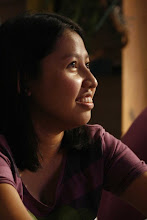
My birthday makes me feel different. I'm actually used to people not remembering my "big day". It started way back in preschool. Everyone's so absorbed with the first day of classes which, most of the time, falls on my birthdate--no one, not even my so-called friends, remember my day.
However there's always a time for me to announce my DOB (Date of Birth). You see, kids, when introducing themselves in class, are limited to saying their name, nickname, age and/or birthday--BARABING! There you go! At that point, my teacher will call on the whole class to sing for me. Probably the most unforgettable Happy-Birthday Performance I ever got was during my 3rd year in highschool. My birthday was revealed to the whole class while we were having our music class. It's quite convenient because we were inside the music room and my music teacher was already sitting in front of a piano. After a few seconds of vocalization, the whole class were able to deliver a fair version of the most sang song in the world, complete with accompaniment, all dedicated to me. It was enough to make me feel special.
Even without having anyone perform a live song for me, I still feel fine this year. People actually remembered my day and actually greeted me. :-) It feels great really.
Before I end, I'd like to share a birthday trivia I learned from my professor in college. On your birthday, people will tell you, "happy birthday" then you'll reply, "thank you." Actually that practice is grammatically incorrect. "Happy birthday" is a phrase made up of the adjective "happy" and the noun "birthday." When put together, they form a phrase that describes a type of "birthday." Technically, the phrase does not say anything about you so why thank the "greeter?" The more apt response would be, "yes, it is a happy birthday" or "no, it isn't". Of course, we can always assume that "happy birthday" is an elliptical phrase which really means, "I hope you'll have a happy birthday." In such case, you can say, "I hope so, too" or "thank you for hoping that." Since the greeter is delivering a shortened message, you as the "gretee(?)" can probably give out an abbreviated retort and say, "thanks!" Therefore, in order for the exchange to be valid, both you and the greeter must be playing the same language game, one that doesn't mind violating grammatical laws. At that note, I'd like to say, it will be best to disregard the trivia I just shared. :-)
Tuesday, June 14, 2005
It's My Party
at
8:40 PM
![]() compartments
Back to the future...or past
compartments
Back to the future...or past
Subscribe to:
Post Comments (Atom)
















No comments:
Post a Comment